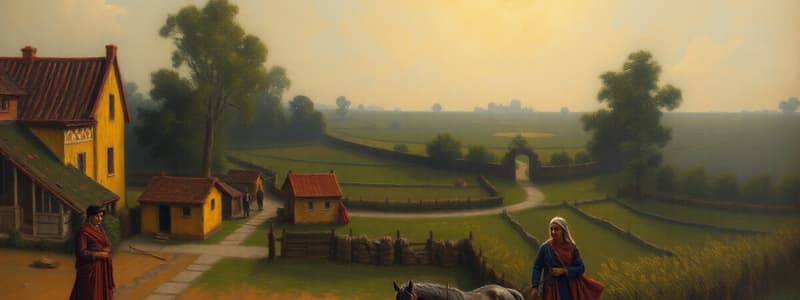Podcast
Questions and Answers
Which of the following factors contributed to the Partition of India in 1947?
Which of the following factors contributed to the Partition of India in 1947?
- The British government's insistence on a single, independent India
- The desire for a unified, secular state
- The economic prosperity of the Indian subcontinent
- Growing communal tensions and political strategies (correct)
What was a major challenge faced by India after its independence?
What was a major challenge faced by India after its independence?
- Addressing widespread poverty and inequality (correct)
- Maintaining a strong military force
- Expanding its colonial holdings
- Promoting a single religious identity for the nation
What is a key feature of the Indian Constitution?
What is a key feature of the Indian Constitution?
- Promoting a single-party political system
- Encouraging economic liberalization
- Guaranteeing fundamental rights and freedoms (correct)
- Establishment of a monarchy
How do social science studies of modern India approach the analysis of the country's development?
How do social science studies of modern India approach the analysis of the country's development?
Which of the following is NOT a major theme in social science studies of modern India?
Which of the following is NOT a major theme in social science studies of modern India?
Which of the following factors contributed to the rise of the nationalist movement in India during the 19th and 20th centuries?
Which of the following factors contributed to the rise of the nationalist movement in India during the 19th and 20th centuries?
What was the primary focus of British colonial policies in India?
What was the primary focus of British colonial policies in India?
How did British colonialism impact education in India?
How did British colonialism impact education in India?
Which of the following best describes the nature of social reform movements in India during the period of British colonialism?
Which of the following best describes the nature of social reform movements in India during the period of British colonialism?
What was the significance of the East India Company's presence in India?
What was the significance of the East India Company's presence in India?
What was a key challenge faced by India after achieving independence?
What was a key challenge faced by India after achieving independence?
Which of the following best describes the social science perspective on Indian history?
Which of the following best describes the social science perspective on Indian history?
Which of the following statements accurately reflects the nature of nationalism in India during the period of British rule?
Which of the following statements accurately reflects the nature of nationalism in India during the period of British rule?
Flashcards
Partition of India
Partition of India
A division of British India into India and Pakistan in 1947, resulting in violence and mass migration.
Impact of Partition
Impact of Partition
Widespread communal violence and displacement leading to immense human suffering during the 1947 division.
Indian Constitution
Indian Constitution
Fundamental law of India, establishing a democratic framework and guaranteeing citizens' rights.
Five Year Plans
Five Year Plans
Signup and view all the flashcards
Social Science Studies
Social Science Studies
Signup and view all the flashcards
Modern Indian History
Modern Indian History
Signup and view all the flashcards
British Colonialism
British Colonialism
Signup and view all the flashcards
Nationalism
Nationalism
Signup and view all the flashcards
Social Reform Movements
Social Reform Movements
Signup and view all the flashcards
East India Company
East India Company
Signup and view all the flashcards
Economic Exploitation
Economic Exploitation
Signup and view all the flashcards
Infrastructure Development
Infrastructure Development
Signup and view all the flashcards
Caste Discrimination
Caste Discrimination
Signup and view all the flashcards
Study Notes
Social Science and Modern History of India
- Modern Indian history encompasses the period from the mid-18th century to the present day, marked by significant social, political, and economic transformations.
- Key themes within modern Indian history include the rise of nationalism, the struggle for independence, the partition of India, and the challenges of nation-building.
- Social science perspectives analyze these historical events, exploring their underlying causes, consequences, and impact on different social groups.
- Social science approaches to Indian history offer a critical understanding of the complexities of society, including issues such as caste, class, gender, and religion.
- British colonialism played a crucial role in shaping modern Indian society, introducing new administrative structures, economic policies, and educational systems.
Impacts of British Colonialism
- The British East India Company's initial presence evolved into direct colonial rule, impacting all facets of Indian life.
- Colonial policies focused on extracting resources and establishing a market for British goods, often at the expense of Indian industries.
- The introduction of new infrastructure, like railways and canals, aimed to facilitate trade and communication, but often served colonial interests.
- Education systems were modified to benefit the needs of the colonial administration.
Emergence of Nationalism
- The 19th and 20th centuries witnessed a growing nationalist movement against British rule.
- Factors contributing to the rise of nationalism included economic exploitation, political disenfranchisement, and cultural resentment towards foreign influence.
- Different strands of nationalism arose, ranging from moderate reform movements to radical independence struggles.
- Key figures championed nationalist ideals, advocating for various approaches to achieving self-rule.
Social Reform Movements
- Alongside the nationalist movement, social reform movements emerged addressing a range of social issues, including caste discrimination, sati, child marriage, and widow remarriage.
- Leaders and organizations challenged traditional social norms and advocated for progressive changes, aiming for a more equitable society.
- Religious reform movements also sought to address social problems and promote progressive values within particular religious communities.
Partition of India
- The Partition of India in 1947, following independence, was a deeply traumatic event marked by widespread communal violence and displacement.
- The partition was driven by complex political and religious factors, fueled by communal tensions and political strategies.
- The partition resulted in a significant migration of populations across the newly formed borders, causing immense human suffering.
Post-Independence India
- Post-independence India faced significant challenges in nation-building, including poverty, inequality, and regional disparities.
- The Indian Constitution established a democratic framework, guaranteeing fundamental rights and freedoms to citizens.
- The country developed a series of Five Year Plans aimed at achieving economic growth and reducing poverty.
- Social science continues to analyze India's political, economic, and social developments, examining issues like economic inequality, social justice, environmental challenges, and the evolution of its democracy.
Themes in Social Science Studies of Modern India
- Social science studies of modern India often focus on exploring the interplay between historical processes and contemporary social realities.
- Examining how social structures (caste, class, gender, religion) have shaped and are shaped by historical events.
- Analyzing the impact of political policies on different social groups.
- Examining the changing nature of economic relations and their effects on various segments of Indian society.
- Examining trends in social mobility and the experiences of different communities over time.
Studying That Suits You
Use AI to generate personalized quizzes and flashcards to suit your learning preferences.





